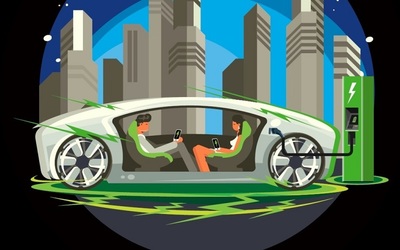NACS Reports COVID-19 Sets Back Pace of Auto Industry Trends
SEE ALSO: Deloitte 2020 Global Automotive Consumer Study - North America (PDF)
SEE ALSO: Deloitte 2020 Global Automotive Consumer Study - Europe (PDF)
Deloitte research looks at consumer interest in new vehicles, technologies and modes of transport.
Special From NACS
To The Auto Channel
By Chris Blasinsky
NACS Content Communications Strategist
ALEXANDRIA, Va. May 22, 2020; From September through October 2019, Deloitte surveyed more than 35,000 consumers in 20 countries to explore their opinions on emerging connected, autonomous, shared and electrified automotive technologies for its 2020 Global Automotive Consumer Study. As you can imagine, those insights have shifted since the global COVID-19 pandemic crisis.
Ryan Robinson, automotive research leader at Deloitte, kicked off the Fuels Institute’s FUELS2020 Virtual Experience with insights from the pre-pandemic 2020 study and insights from newer surveys launched in April.
Much of the global automotive industry’s focus during the past decade has been on autonomous and connected vehicle technology, shared mobility services and electrification. Prior to COVID-19, macrotrends observed by Deloitte research indicate that global vehicle demand had begun to soften, pointing to a cyclical downshift while original equipment manufacturers (OEMs) invested billions in advanced technologies. Meanwhile, consumer concerns centered on:
Privacy and data security: For connected car technologies, consumers are concerned about the type of entities that receive their data, which becomes a trust issue. Many consumers say they would not trust anyone other than the OEM to manage the data they share.
Autonomous vehicles: Consumer interest in autonomous vehicle technologies have stalled in most markets. Reports on crashes involving AVs have had a significant and lasting impact on consumer perception of the technology overall, although one area that seems to boost consumer confidence is whether the technology can be standardized as well as government certified.
Multi-modal mobility: Consumers remain resistant to multi-modal mobility; however, regardless of country, Deloitte research suggests that consumers agree the best way to reduce traffic congestion is greater access to mass transit (44% of consumers agree in the U.S.).
Combining different modes of transportation into a single trip remains an occasional behavior for most consumers: 48% of U.S. consumers say they rarely combine modes of transport, 39% say never, and 13% say one or more times per week (bike to bus or train station, for example). Ride-hailing frequency has also declined—in some cases half of what it was in 2017—suggesting the halo effect of these services is wearing off.
Electric vehicles: Auto manufacturers have made significant investments in the future of EVs, and consumers cite lower emissions and operating costs as the main reasons for interest in hybrid- and battery-electric vehicles. However, there remains a disconnect around range anxiety. While most U.S. consumers drive an average of 27 miles per day, they expect mileage per charge to greatly exceed their daily requirements. Deloitte research also suggests that most people recognize they would use a BEV like a smartphone—recharge it overnight at home.
Pandemic Insights: Robinson shared new Deloitte research on potential changes in consumer behavior, how consumers will and want to re-engage with the automotive sector and how the transportation industry could move forward post-pandemic.
Tracking consumer sentiment in the past month, Deloitte found that consumers intend to delay a planned vehicle purchase and expect to keep their current vehicle longer expected. This suggests two concerns: health and safety, as people don’t want to go to a dealership, and financial concerns around making large purchases. Some consumers are also delaying regular vehicle maintenance, which also indicates health and safety concerns and greater financial pressures.
There also has yet to be a noticeable shift in online vehicle sales, with just 21% of U.S. consumers saying they would buy their next vehicle online if it was available. “We thought these numbers might be higher, but that could be a lack of availability in some markets,” said Robinson, noting that Deloitte will continue to track this metric over time to see how consumers are willing to engage with the auto market and how transactions will develop.
During the pandemic most U.S. consumers (79%) agree that their vehicle represents a key social distancing tool. They remain concerned about public transit, with 60% of U.S. consumers planning to limit use in the next three months, which will impact mass transit. Ride-hailing serves are also a concern, with 58% of U.S. consumers planning to limit use in the next three months.
Wrapping up, Robinson noted that there’s a huge question mark on which entities will take the lead on EV charging infrastructure. “The existing fuel companies probably have a large part to play because they have the locations that make sense, and from a fossil fuel standpoint, it’s all there,” he said.



